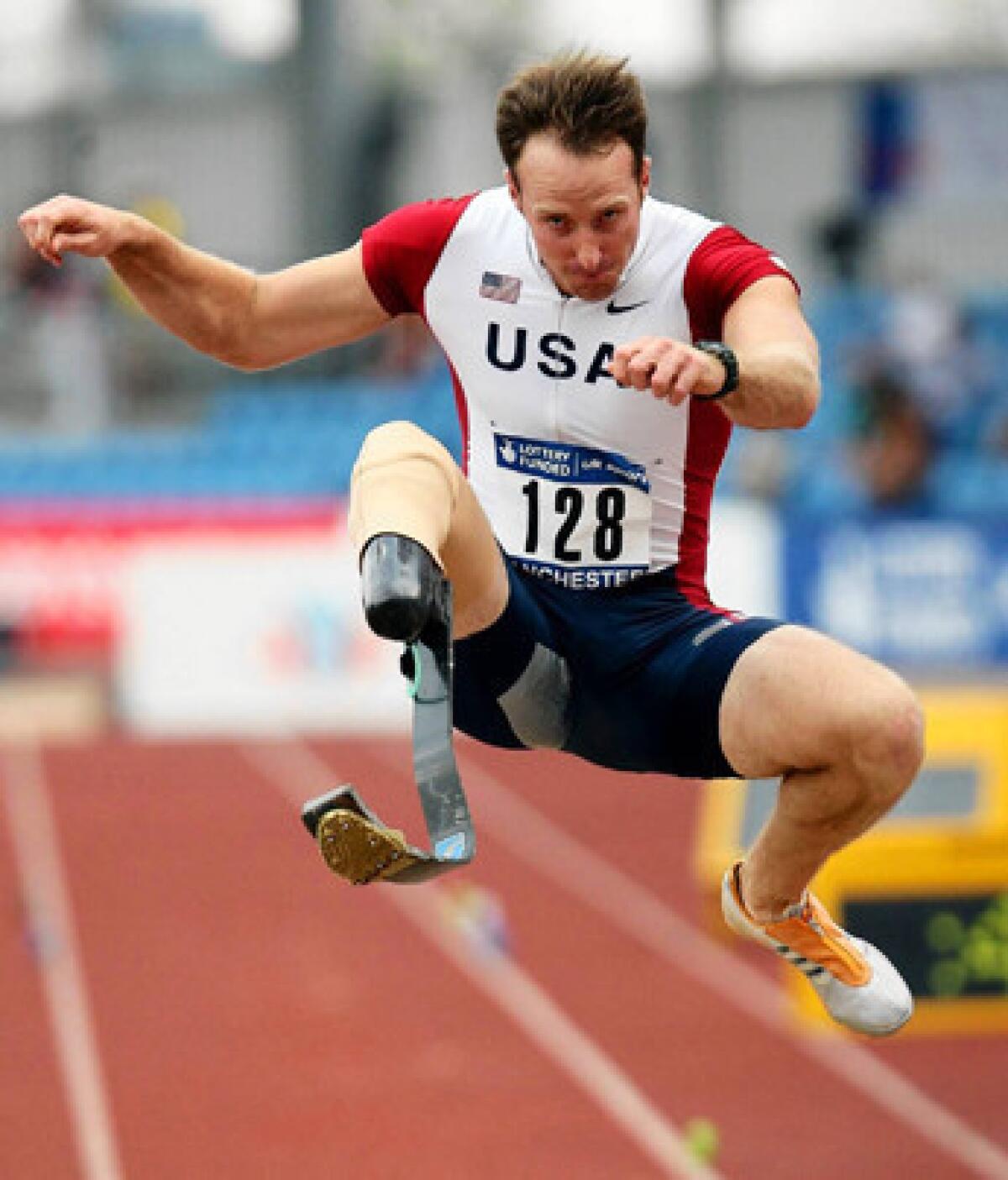5 Questions: Paralympian Casey Tibbs stays in the chase

The Paralympic Games don’t get as much attention as the Olympics, but the stories are often more inspiring — among them, people who experience severe physical trauma and come out stronger on the other side. That’s what happened with Casey Tibbs.
Tibbs, who lost his leg below the knee in a motorcycle accident, is the first American active-duty military member to compete in the Paralympics, and between the Athens and Beijing Games has seen the view from all three podium positions competing in the 400-meter relay, pentathlon and long jump.
He’s on his way to his third Paralympics later this month, this time as an alternate in the long jump. He’s doing just what his grandfather told him: “Never quit chasing the rabbit.”
Tell me about your life before the accident and what you did for exercise.
Growing up in Texas, you’re more known for what you do at sports than what you do in the classroom. I played football, soccer, basketball and track. It seemed like I was going to practice all the time. Track and field was definitely my favorite.
In the Navy you have to be fit, and I was still playing some intramural sports and running — the typical adult trying to stay fit stuff. It was nothing too competitive.
Tell me about the accident. Was there a dark period you went through?
Most people assume I lost it in the service, but it was a motorcycle accident in 2001. I’d just been promoted to petty officer and was out for a ride with some friends, and I lost control in a corner and hit a guardrail. The leg was amputated in the accident. I remember looking down and seeing that it was gone and I started to freak out and went into shock.
It’s been over 11 years now, but I can’t really remember a dark period. There were a couple of moments where I thought I was going to be in a wheelchair, but those were just moments. There was no prolonged depression. And when I found out about the Paralympics, then I started to feel a lot better.
Do you feel athletic competition is a good way to rehabilitate oneself from a disabling injury?
Yes. It was a key component. It was about a year after my accident that I found out about the Paralympics and the opportunities. I remember telling my chief about it, and the Navy was behind it. My wife and grandfather have been very supportive as well.
Right away I decided I wanted to go to Athens for 2004, but after my first eight months I was seeing just how good the other athletes were and how much I would have to step my game up just to qualify for the U.S. team. This was a professional sport full of hard-core athletes. Just to go to the Games and walk in the opening ceremonies and represent your country is an amazing experience. To bring home a medal is the icing on the cake.
How have the demands of training affected your work and home life?
There are a lot of sacrifices. Sometimes it’s exhausting. When it’s time for me to train, I’ve got to turn everything else off. My wife is the first person I talk to before and after training, and nobody can talk to me during. My wife understands and has been very supportive, even with three kids and a full-time job. For two years out of the last three, I was deployed with the Navy. When you’re not training, nutrition is really key for me as well.
Tell me about the work you’ve done with military amputees.
I’m grateful to have been a part of working at the Naval Medical Center in San Diego at the C5: the Comprehensive Combat and Complex Casualty Care. I was running the Warrior Athlete Program. I would see a soldier, a sailor or a Marine come into the hospital missing limbs or other active-duty injuries and we’d use Paralympic and regular sports in the rehab process. It’s proven to help; it really works to turn their lives around.
Go beyond the scoreboard
Get the latest on L.A.'s teams in the daily Sports Report newsletter.
You may occasionally receive promotional content from the Los Angeles Times.



